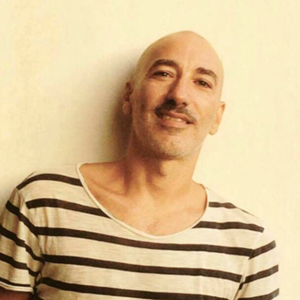BIO
MORE
Juan Carlos BrachoJuan Carlos Bracho (La Línea de la Concepción, Cádiz; 1970). BA in Fine Arts from the University of Cuenca. He holds a series of national honors, including the 2005 Generaciones and Purificación García awards, Premio ABC in 2006, Iniciarte in 2009 and the Fundación Centenera Jaraba Contemporary Drawing Prize in 2011.
He has completed residencies in Spain and abroad: Hangar (Barcelona, 2002; CALQ, Quebec, 2005), Landesatelier (Salzburg, 2012), Birch Creek Ranch (Utah, 2015).
He combines his work as an artist with teaching projects in universities and art centers, which he sees as central to his experience as a creator. His work forms part of leading public and private collections in Spain and abroad. He is represented by Galería Carles Taché and Galería Ángeles Baños.
PROJECT
Written on the wind, 2016
(Video, 25′)
Written on the Wind is the title of two linked, full-scale films, projected side by side, comprising one long continuous take of two slow, simple and obsessive actions: the erasure of the reflective surface of two large mirrors in the midst of a desert landscape.
A double projection where the image we see vanishing on one side is simply the continuation of the one being gradually revealed on the opposite side, and vice versa, as if each was simultaneously the other’s reverse or reflection.
A mirror is defined by the dictionary as “a polished surface that shows images by reflection.” The ultimate spaceless place – also lacking density – that nonetheless has room for everything, up to infinity; a threshold between the real, imaginary and symbolic that absorbs and condenses all that surrounds it. And, what is an image?: ‘1. The visible appearance of a person or thing produced by certain optical phenomena / 2. The likeness of an object on a mirror, screen or similar.’ An image is always a reflection. Something intangible, uncertain or undefined whose meaning is not confined to what we see or recognize, but is associated with a wealth of memories and mental visions buried in our thought.
The screen as a residual surface and referent for our visual imaginary is a recurrent theme in Juan Carlos Bracho’s recent work, along with landscape as a mirror of ourselves, our most unfathomable consciousness.
But are we truly critically aware of the reality around and before us, or do we simply stand hypnotized in front of these mirror reflections, the images we compulsively consume and that our thoughts circle round?
This project explores the most intimate meaning of the idea of landscape – a synergetic element in continuous flux – and the mirror as a surface that reflects what it does not own.
A reflection on what we perceive, on the screen and the images it projects in endless succession, increasingly ethereal, intangible and devoid of meaning.

